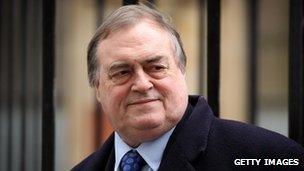Lord Prescott demands concrete Labour policies
- Published

In August, Lord Prescott urged Ed Miliband to "kick out" under-performing shadow cabinet members.
Labour needs to put forward a coherent agenda and concrete policy proposals, the party's former deputy leader, Lord Prescott, has said.
In an interview with Total Politics magazine, he urged Labour leader Ed Miliband to set out a "clear" vision about what he wants to achieve.
He also questioned the character of the new generation of Labour MPs, saying the party "is moving on".
Lord Prescott served as deputy PM under Tony Blair from May 1997 to June 2007.
He said Mr Miliband's attempts to appear strong by seeking confrontation with the unions were "not enough" and suggested it was getting close to the stage where the Labour leader would need to lay out his policies to back up his One Nation vision.
"But what about your policies? What are you doing about that?" he said.
Character of Labour MPs
Lord Prescott said the perception of having a strong leader was not enough and urged Mr Miliband to have "a very clear idea, a vision of what you're going to do".
"That's about campaigning," he continued, "about drawing the differences, and not being buffeted about by the problems that come from a government who have chosen a different set of priorities".
"You have to deliver change but connected to your principles and beliefs," he added.
He contrasted his background as a former trade union official to that of Labour's current MPs who he said had been "researchers, things like that".
"The party is moving on, it's a different system, and it's producing different people. There's less to pick from. There's not many of them coming out now," Lord Prescott said.
"Most of them have been to university. Well, fine, great, they've got more brains but I'm not sure about the character. You've got to have a message and a vision and a leader that feels they are taking that on and believe in it. In politics, character is still part of it."
Another former deputy Labour leader, Lord Hattersley, also told the magazine that the party "needs to demonstrate what it stands for" and set out its ideology.
"When I was a young man, it was clear what it stood for: there was a large army of the poor, there were masses of houses that needed to be built, and there wasn't a health service... Now it's more complicated. Society has changed, and we need a firm ideological question because people don't know what we stand for," he said.
- Published20 September 2013
- Published19 September 2013
- Published18 August 2013